Commercial HVAC Carbis Bay
Top 10 Industrial HVAC in Carbis Bay
Get up to 3 Commercial HVAC Services quotes for your project today! Compare profiles, reviews, accreditations, portfolio, etc... and choose the best service.

Help For Heat
48 reviews9 Limes Ln, Liskeard, PL14 4HR, GBHelp For Heat Emergency Plumber Boiler Repair Liskeard is a family run plumbing business, providing Liskeard area with a friendly professional service for all your plumbing and boiler repair requirements. Our 24 hour emergency plumber Liskeard. With locally based engineers covering these areas, Help For Heat Emergency Plumber Boiler Repair Liskeard specialize in all types of Plumbing services including Emergency Plumbing call outs, Boiler Repair, Boiler installation, Boiler servicing and full heating installations. Help For Heat Emergency Plumber Boiler Repair Liskeard pride ourselves as being one of the area’s premier 24 hour emergency Plumbing companies. When a problem occurs that requires an immediate response we offer complete solutions including Boiler repairs and waterleak repairs throughout Liskeard 24 hours a day, 365 days a year. Highly skilled local Plumbers are on standby with fully equipped vans containing all the necessary equipment to carry out any Plumbing service. With our local Liskeard engineers you know you’re in safe hands. We have had many recommendations through word of mouth. This is due to our policy of putting customer satisfaction as well as safety, above all else. Please contact one of are friendly office staff now to book a appointment.
- Services
- Why Us?
- Accreditations
- Gallery
Get Quote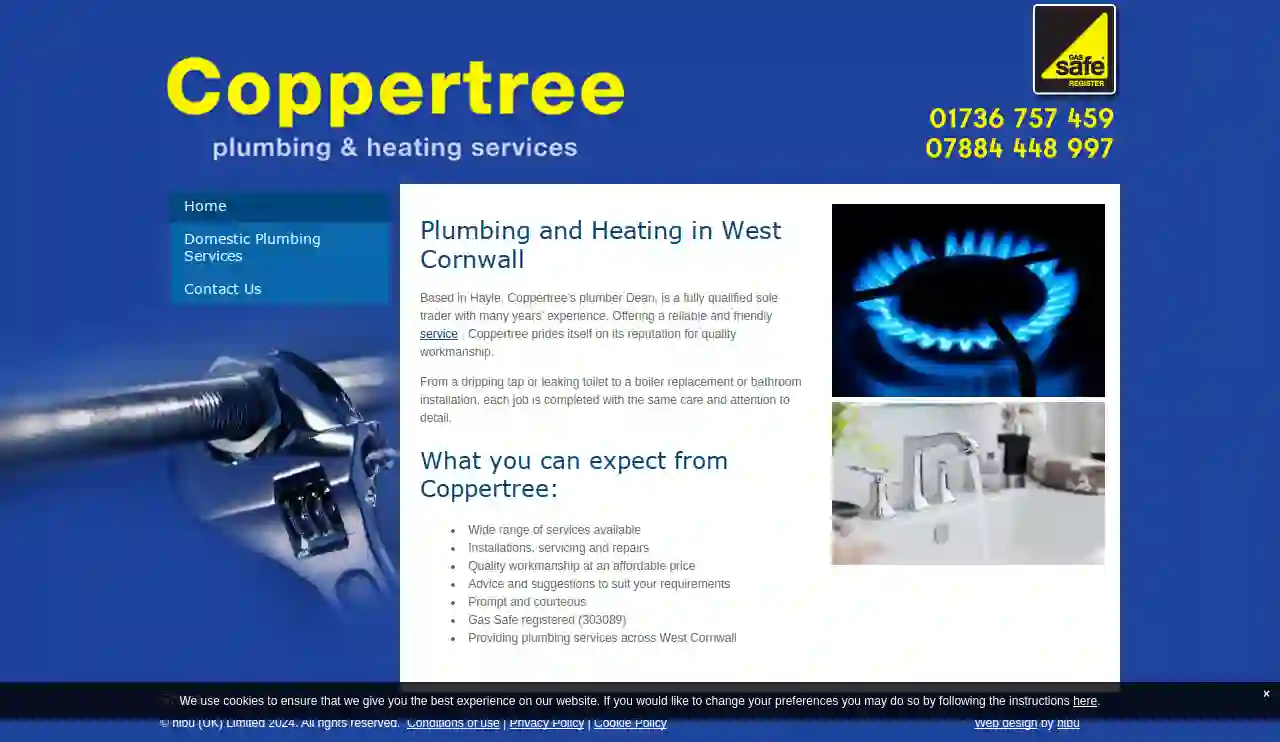
Coppertree Plumbing & Heating Services
52 reviews5 Trelawney Place, Hayle, TR27 4LF, GBCoppertree Plumbing & Heating is a fully qualified sole trader with many years' experience, based in Hayle, West Cornwall. We pride ourselves on our reputation for quality workmanship, offering a reliable and friendly service. From a dripping tap or leaking toilet to a boiler replacement or bathroom installation, each job is completed with the same care and attention to detail. We provide a wide range of services, including installations, servicing, and repairs, with quality workmanship at an affordable price. Our team is Gas Safe registered (303089) and provides plumbing services across West Cornwall.
- Services
- Why Us?
- Our Team
- Gallery
Get Quote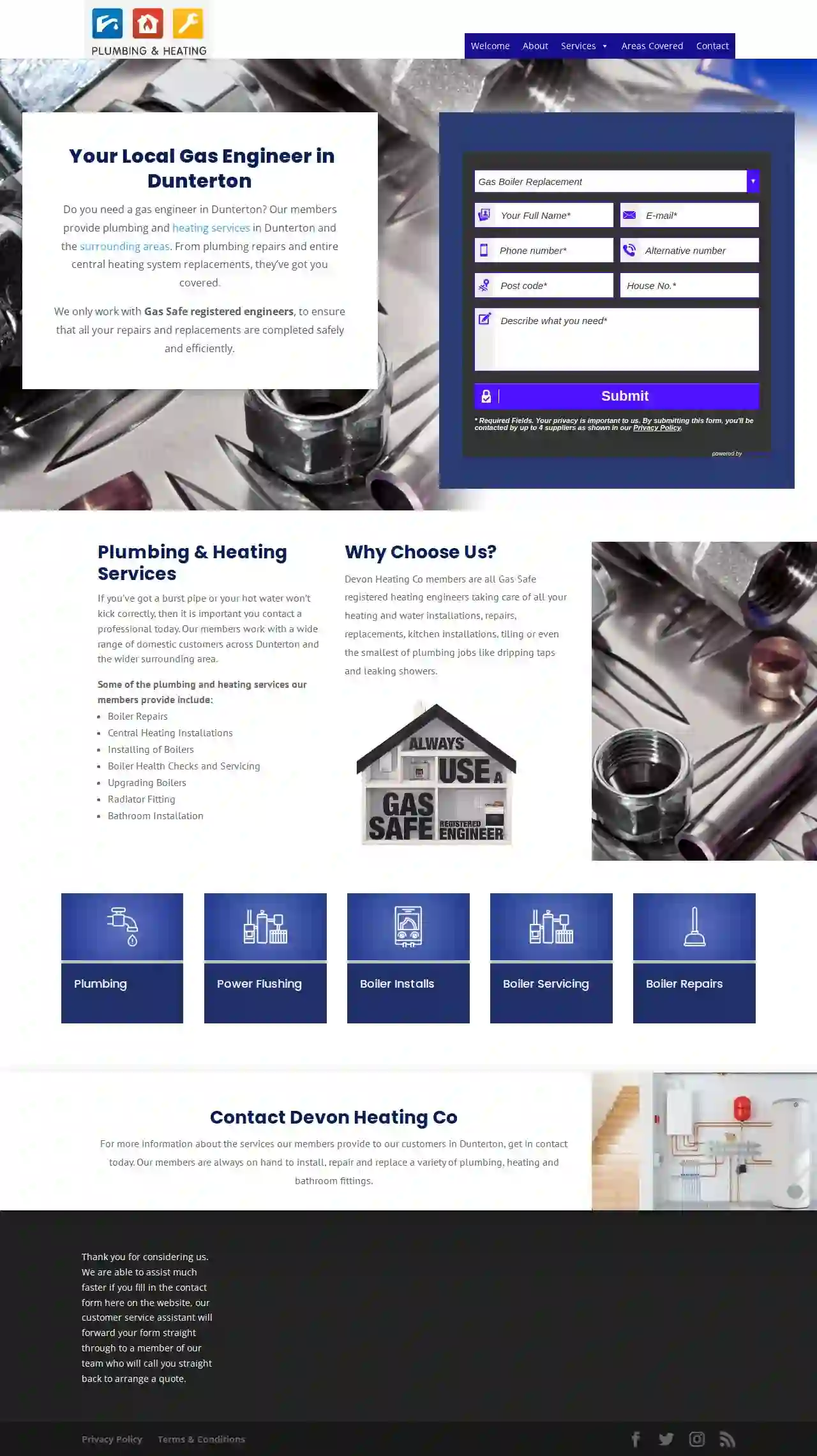
Craig Williams Plumbing & Heating Engineer
53 reviewsTruro, GBDevon Heating Co members are all Gas Safe registered heating engineers taking care of all your heating and water installations, repairs, replacements, kitchen installations, tiling or even the smallest of plumbing jobs like dripping taps and leaking showers. We only work with Gas Safe registered engineers, to ensure that all your repairs and replacements are completed safely and efficiently. If you’ve got a burst pipe or your hot water won’t kick correctly, then it is important you contact a professional today. Our members work with a wide range of domestic customers across Devon and the wider surrounding area. Some of the plumbing and heating services our members provide include: Boiler Repairs, Central Heating Installations, Installing of Boilers, Boiler Health Checks and Servicing, Upgrading Boilers, Radiator Fitting, Bathroom Installation.
- Services
- Why Us?
- Gallery
Get Quote
Off Grid Plumbing & Heating Ltd
510 reviewsHelston Road, Porkellis, Wheal Cock Barn, TR13 0JS, GBOFF GRID PLUMBING AND HEATING LTD. are your local plumbing, heating, and renewable energy specialists with over a decade of experience in the industry. We pride ourselves on providing a professional and reliable service throughout Cornwall. We supply professional, commercial and domestic plumbing, heating, and renewable energy solutions throughout Cornwall. Our work has taken us to rural and urban sites throughout the county, working on big and small projects. Our Mission To provide the most efficient and cost-effective solutions whilst inspiring and implementing environmentally friendly alternatives. Our Values We strive to go above and beyond for all of our clients, no matter the challenge. We aim to deliver a superior standard of work, consistently, across all of our services. What We Provide We supply various commercial and domestic plumbing, heating, and renewable energy solutions throughout Cornwall. Contact us today for further support.
- Services
- Why Us?
- Accreditations
- Our Team
- Testimonials
- Gallery
Get Quote
Superior Plumbing & Heating of Cornwall
4.856 reviews150 Britannia Road East, unit 18, Mississauga, L4Z 2A4, GBSuperior Plumbing & Heating is a local company with years of experience in providing top-notch plumbing and HVAC services in Cornwall, Ontario. Our team of fully licensed and qualified plumbers is dedicated to providing fast and reliable solutions for all your plumbing needs. We offer a wide range of services, including toilet repair, shower installation, sump pump installation, and more. Our prices are affordable, and we provide a warranty of up to 90 days for all our services. With over 400 positive reviews, you can trust us to get the job done right. Contact us today to schedule an appointment or request emergency service.
- Services
- Why Us?
- Gallery
Get Quote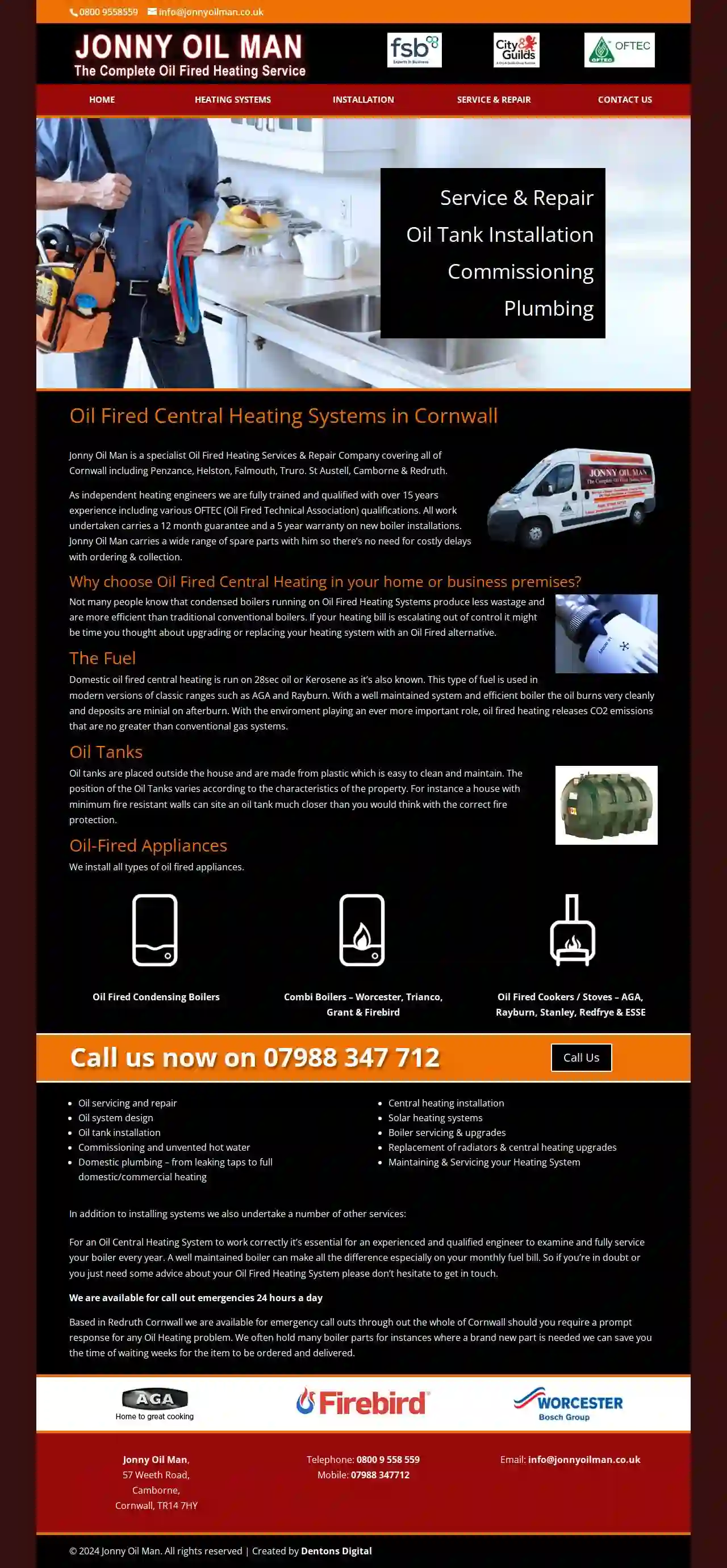
Jonny Oil Man
552 reviews57 Weeth Road, Camborne, TR14 7HY, GBJonny Oil Man is a specialist Oil Fired Heating Services & Repair Company covering all of Cornwall including Penzance, Helston, Falmouth, Truro. St Austell, Camborne & Redruth. As independent heating engineers we are fully trained and qualified with over 15 years experience including various OFTEC (Oil Fired Technical Association) qualifications. All work undertaken carries a 12 month guarantee and a 5 year warranty on new boiler installations. Jonny Oil Man carries a wide range of spare parts with him so there’s no need for costly delays with ordering & collection. Why choose Oil Fired Central Heating in your home or business premises? Not many people know that condensed boilers running on Oil Fired Heating Systems produce less wastage and are more efficient than traditional conventional boilers. If your heating bill is escalating out of control it might be time you thought about upgrading or replacing your heating system with an Oil Fired alternative. The Fuel Domestic oil fired central heating is run on 28sec oil or Kerosene as it’s also known. This type of fuel is used in modern versions of classic ranges such as AGA and Rayburn. With a well maintained system and efficient boiler the oil burns very cleanly and deposits are minial on afterburn. With the enviroment playing an ever more important role, oil fired heating releases CO2 emissions that are no greater than conventional gas systems. Oil Tanks Oil tanks are placed outside the house and are made from plastic which is easy to clean and maintain. The position of the Oil Tanks varies according to the characteristics of the property. For instance a house with minimum fire resistant walls can site an oil tank much closer than you would think with the correct fire protection. Oil-Fired Appliances We install all types of oil fired appliances. Oil Fired Condensing Boilers Combi Boilers – Worcester, Trianco, Grant & Firebird Oil Fired Cookers / Stoves – AGA, Rayburn, Stanley, Redfrye & ESSE Call us now on 07988 347 712 Call Us Oil servicing and repair Oil system design Oil tank installation Commissioning and unvented hot water Domestic plumbing – from leaking taps to full domestic/commercial heating Central heating installation Solar heating systems Boiler servicing & upgrades Replacement of radiators & central heating upgrades Maintaining & Servicing your Heating System In addition to installing systems we also undertake a number of other services: For an Oil Central Heating System to work correctly it’s essential for an experienced and qualified engineer to examine and fully service your boiler every year. A well maintained boiler can make all the difference especially on your monthly fuel bill. So if you’re in doubt or you just need some advice about your Oil Fired Heating System please don’t hesitate to get in touch. We are available for call out emergencies 24 hours a day Based in Redruth Cornwall we are available for emergency call outs through out the whole of Cornwall should you require a prompt response for any Oil Heating problem. We often hold many boiler parts for instances where a brand new part is needed we can save you the time of waiting weeks for the item to be ordered and delivered.
- Services
- Why Us?
- Accreditations
- Gallery
Get Quote
Walker ClimateCare
4.8Cornwall, ON, 1714 Vincent Massey Drive, K6H 5R6, GBWalker ClimateCare has been providing expert heating, ventilation and air conditioning services to Cornwall, SD&G and Akwesasne since 1972. VOTED CORNWALL'S BEST FURNACE, AIR CONDITIONING & HEATING SERVICE CONTRACTORS. Walker ClimateCare has been serving Cornwall and area customers since 1972. If you are outside of Cornwall please review our service area and we will do our best to help! EMERGENCY CORNWALL HEATING AND AIR CONDITIONING REPAIR SERVICES. Walker ClimateCare is one of the most experienced HVAC companies in Cornwall. COMMITTED TO BEING THE BEST. Walker ClimateCare is a member of the ClimateCare Cooperative Corporation. ClimateCare is a network of independent heating, ventilation and air conditioning (HVAC) contractors. SERVICE & INSTALLATIONS. We service and install boilers and radiant heat, service and install gas furnaces and air conditioners, install full duct systems, service and install attic air conditioning systems (high velocity and low velocity). ECOHOME FINANCING SERVICES. Really, it's no problem. At Walker ClimateCare, we have HVAC financing available through Ecohome financing services. You can finance your new furnace, air conditioner or complete system at reasonable interest rates with no down payment. SERVICE AGREEMENTS & ANNUAL MAINTENANCE AGREEMENTS. Walker ClimateCare offers a WeCare Protection Plus Maintenance Plan For a limited time, get a precision tune-up for only $59.99! Ready to Provide OUTSTANDING SERVICE. GET HELP NOW. Get the peace of mind you deserve. Have your equipment maintained by our factory-trained technicians. Schedule your annual maintenance check-up today. WE DO MORE THAN HEATING AND COOLING. See more REBATES & SPECIAL OFFERS. Are you thinking about replacing your old heating and cooling equipment, but not sure that you can afford it? Aside from financing options, Walker also offers rebates for homeowners that can help make that dream a reality.
- Services
- Why Us?
- Accreditations
- Our Team
- Testimonials
- Gallery
Get Quote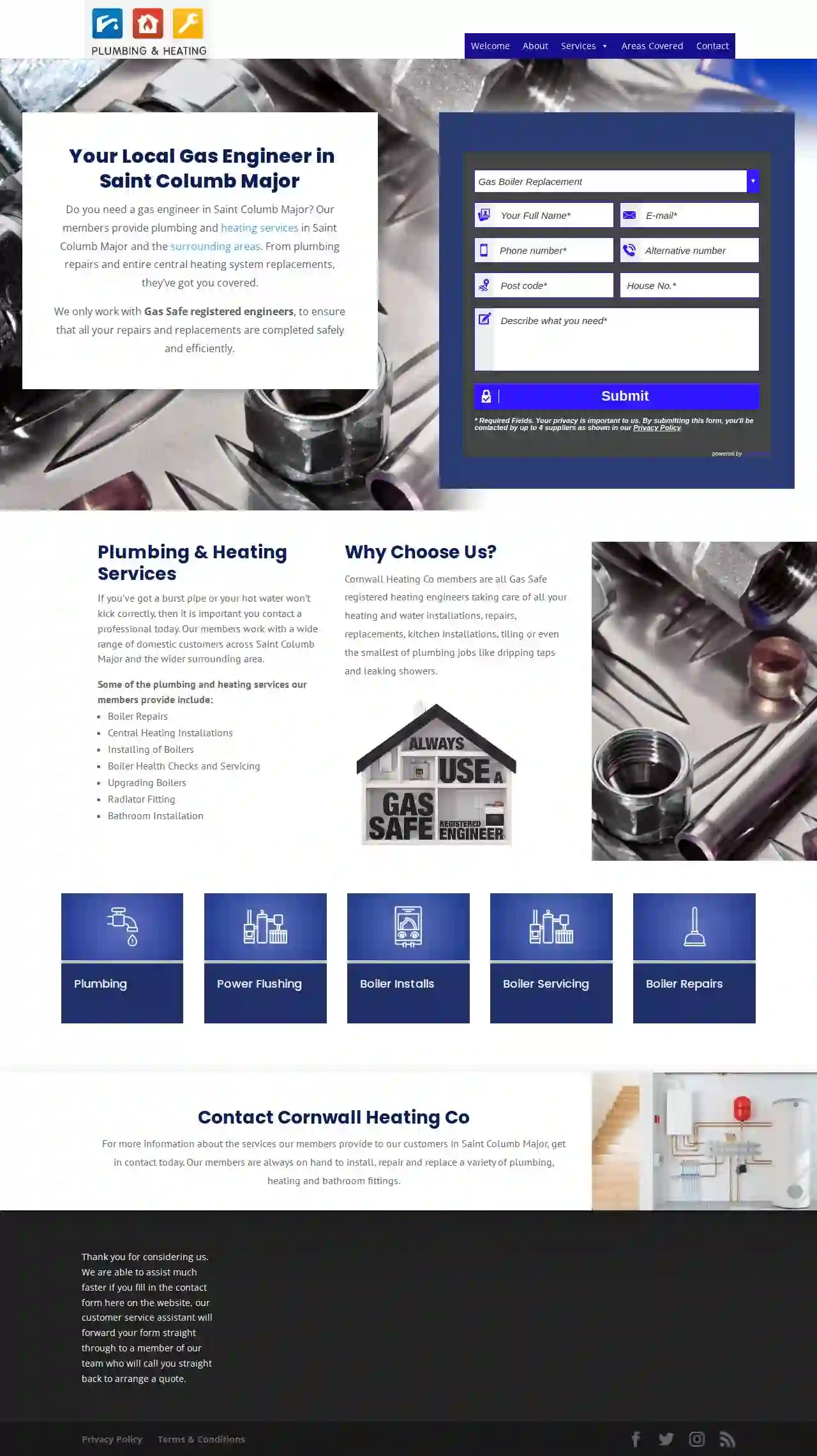
Gas Install Ltd - Gas Installation Services in Cornwall
51 reviewsTruro, GBCornwall Heating Co members are all Gas Safe registered heating engineers taking care of all your heating and water installations, repairs, replacements, kitchen installations, tiling or even the smallest of plumbing jobs like dripping taps and leaking showers. We only work with Gas Safe registered engineers, to ensure that all your repairs and replacements are completed safely and efficiently. If you’ve got a burst pipe or your hot water won’t kick correctly, then it is important you contact a professional today. Our members work with a wide range of domestic customers across Cornwall and the wider surrounding area. Some of the plumbing and heating services our members provide include: Boiler Repairs, Central Heating Installations, Installing of Boilers, Boiler Health Checks and Servicing, Upgrading Boilers, Radiator Fitting, Bathroom Installation.
- Services
- Why Us?
- Gallery
Get Quote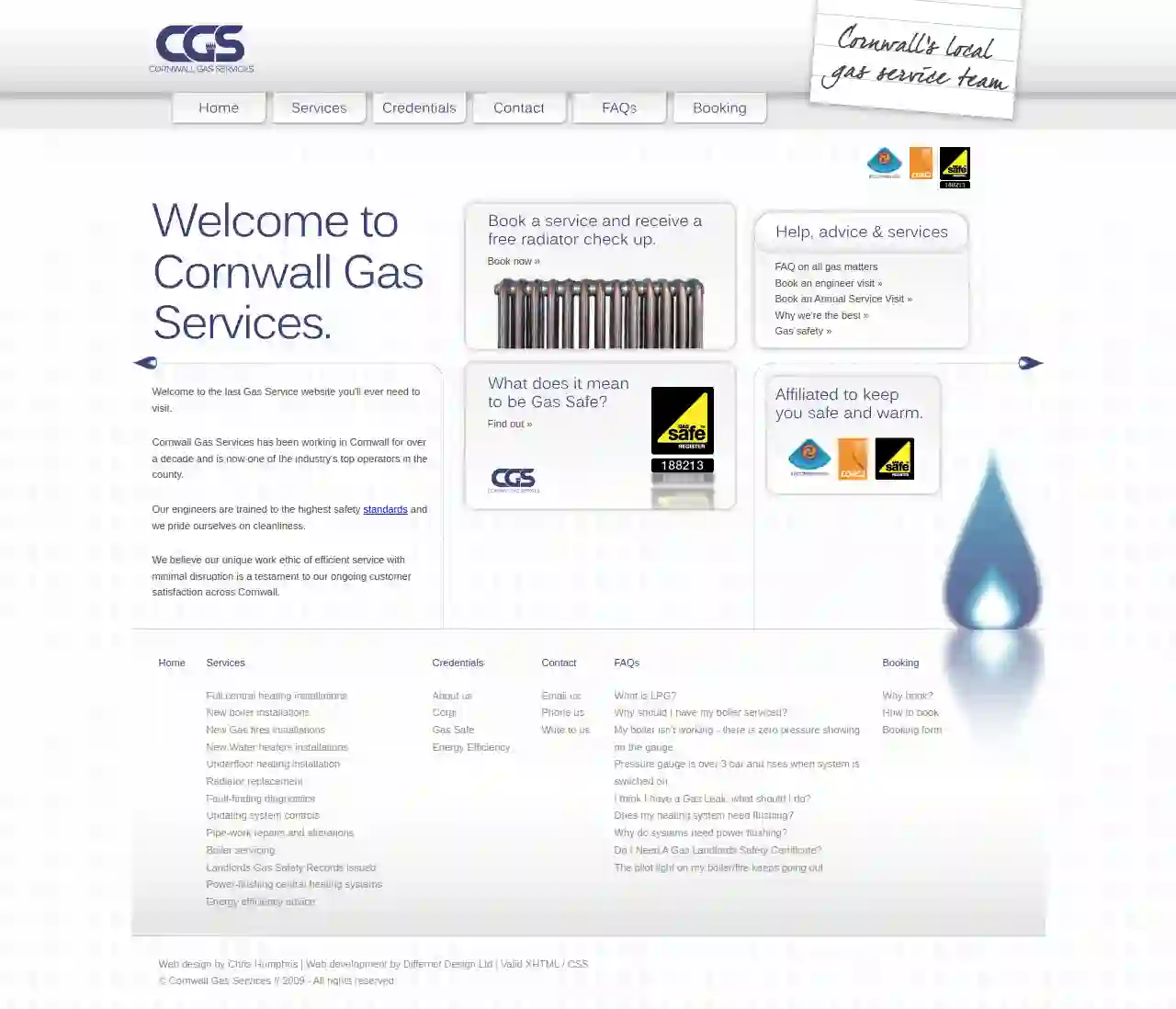
Cornwall Gas Services
4.36 reviewsTruro, GBWelcome to Cornwall Gas Services, a leading provider of gas services in Cornwall. With over a decade of experience, we have established ourselves as one of the top operators in the county. Our team of fully qualified engineers is dedicated to providing efficient and safe services, ensuring that your gas equipment operates to the highest standards. We pride ourselves on our unique work ethic, which prioritizes minimal disruption and maximum customer satisfaction. Whether you need a boiler service, repair, or installation, or require assistance with a gas fire or water heater, we are here to help. Contact us today to learn more about our services and how we can assist you.
- Services
- Why Us?
- Accreditations
- Our Team
- Gallery
Get Quote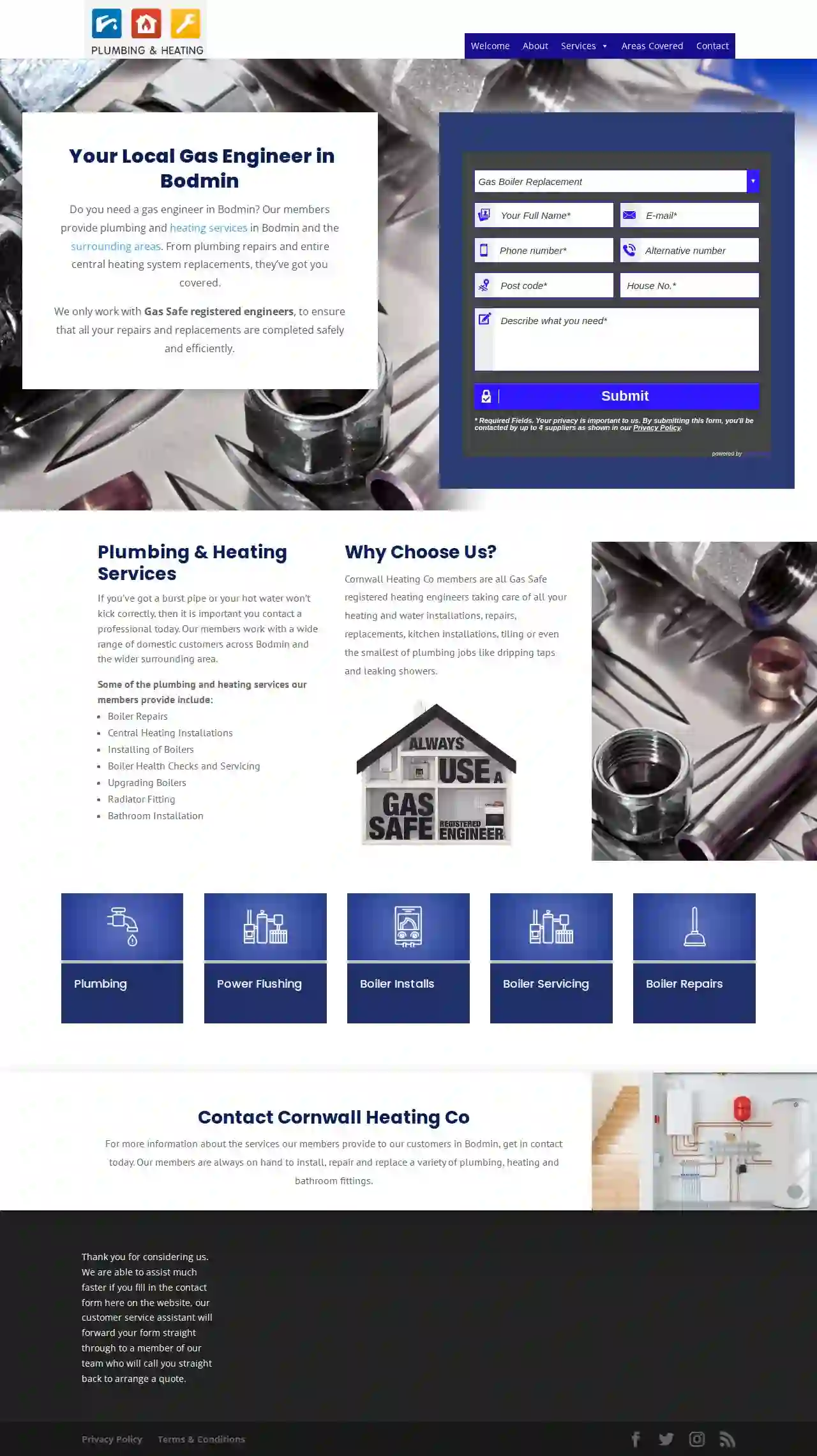
A C Plumbing & Heating
51 reviewsUnit 1, Bodmin Industrial Estate, Bodmin, Cornwall, TR1 1AA, GBCornwall Heating Co is a network of Gas Safe registered heating engineers serving Cornwall and the surrounding areas. They offer a wide range of plumbing and heating services, including boiler repairs, central heating installations, boiler servicing, power flushing, and smart thermostat installations. The company emphasizes safety and efficiency, ensuring all work is completed by qualified professionals. They cater to domestic customers and handle everything from small plumbing jobs like dripping taps to large-scale projects like bathroom installations.
- Services
- Why Us?
- Gallery
Get Quote
Over 12,692+ HVAC Contractors onboarded
Our HVAC contractors operate in Carbis Bay and surroundings!
HVACCompaniesHub has curated and vetted the Best HVAC Companies in and around Carbis Bay. Find a reliable contractor today.
Frequently Asked Questions about Commercial HVAC
- Building Size and Type: Larger or specialized buildings (restaurants, labs) have more complex requirements.
- System Type and Capacity: Different HVAC systems (e.g., rooftop units, VRF systems) have varying costs.
- Efficiency: Higher-efficiency units typically have a higher initial cost.
- Installation Complexity: Ductwork, electrical wiring, and other installation factors influence the final price.
- Location: Labor costs and local regulations can affect pricing.
What is an Air Handling Unit (AHU)?
Why is indoor air quality (IAQ) important for my business?
How often should I replace the air filters in my commercial HVAC system?
How much does a commercial HVAC system cost?
What is an Air Handling Unit (AHU)?
Why is indoor air quality (IAQ) important for my business?
How often should I replace the air filters in my commercial HVAC system?
How much does a commercial HVAC system cost?
- Building Size and Type: Larger or specialized buildings (restaurants, labs) have more complex requirements.
- System Type and Capacity: Different HVAC systems (e.g., rooftop units, VRF systems) have varying costs.
- Efficiency: Higher-efficiency units typically have a higher initial cost.
- Installation Complexity: Ductwork, electrical wiring, and other installation factors influence the final price.
- Location: Labor costs and local regulations can affect pricing.